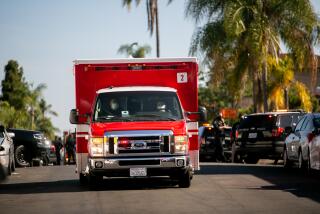Wounds That Need Healing : Emergency Room Workers Try to Keep Pace as the Violence Escalates--and the Nights Get Longer : DR. OSCAR LUJAN
- Share via
On Saturday nights we see a lot of violence, a lot of trauma. The number of medical problems--what we call the heart attacks, asthmas, congestive heart failure--are pretty constant, but there’s an increase in the violent problems on the weekends. We might have a gunshot and a stabbing, then another gunshot coming in and a traffic accident.
We keep the family members in the waiting area, so they never really see the situation on a moment-to-moment basis. I don’t know if the family realizes this is a big social problem. It’s more a personal problem for them, a very personal tragedy.
I don’t get angry about it, it’s more feelings of loss when we don’t win. But I don’t really get upset during the time I’m doing what needs to be done, say, if the patient is a gang member. They need help like anyone else.
It takes a certain type of person to work in an emergency room. It’s very intense. The people who work here are usually those who thrive on the fast pace and the diversity--the variety of things that you see here that you might not experience otherwise.
Even on one Tuesday night, we had eight gunshot victims within an hour and a half. We already had several critical patients that had to be moved aside. We would no sooner stabilize the incoming patients when we’d have to move them aside for another to come in. We had surgical teams and nurses running down the corridors, pushing gurneys to the operating rooms--and they kept coming. There were patients in the aisles, IVs being started and major surgical procedures best performed in the operating room. The sounds of physicians giving orders were mixed with the cries of patients in pain--and the color red was everywhere. It was a long night.
Though the staff is very professional, we do vent our feelings to each other, because we understand between ourselves that we need to talk about these things. We talk about it one-on-one.
The emergency room at County-USC is big. We see 200,000 patients a year. The caseloads here are only on the increase--not just because of the street violence, but we’ve had an increase among the sicker patients, people who have lost their insurance as a result of becoming unemployed. They’ve added to the high number of patients we already have.
We’re a 24-hour operation, so there are different shifts, but in time, you get to know everyone, and it’s like an extended family. We might have a team of six physicians and eight nurses, just in one area. The paramedics make the initial contact with the patient, stabilize them, give immediate care. It’s an uncontrolled environment out there for them; at least we have some control in here. We have the security of being in our space.
We see somewhere in the neighborhood of six gunshots in a day.
Sometimes, if we can give treatment in a timely manner, certainly I feel satisfied, gratified that I was able to help someone. On those occasions when we don’t get to the patient on time, I do experience a sense of loss. Loss that another young person didn’t make it--and a sense of loss for the family.
These young victims of violence are in their 20s and 30s, they’re teens and sometimes they’re just children. At the time we are very methodical, doing what has to be done, assessing the injuries and treating the patient. It’s only after it’s over that you have time to sort out your feelings. Then you realize what’s happened and who it’s happened to, you think of the other people who are involved.
When I’d see children injured, I used to go home after my shift, wake up my kids to play with them at midnight or 2 o’clock in the morning. I’m sure they didn’t understand, but sometimes I just needed to hold them.
I don’t like the violence, but I can’t say that I know how to go about avoiding it. I don’t think it’s appropriate to bring people in to witness this kind of tragedy--certainly not to witness the medical procedures that go on. But if these young people were to realize the consequences of what they do, they would not be doing it because of the pain to the victim, the pain to the families. They just don’t seem to see the inhumanity of it.
One of the positive things about being here is the emergency medicine residency training program. This is the teaching hospital and one part I particularly enjoy is working with the students. If there’s one thing I like to teach them here, it’s to remember your patients are people.






